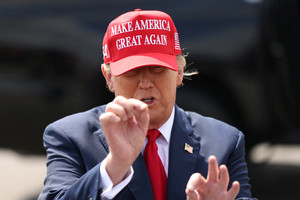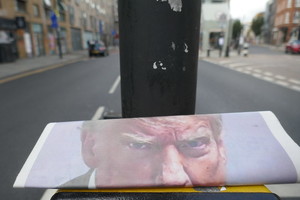Are Democrats Trump’s Best Ally?

From the Right
This piece was originally published in the Deseret News (Center bias).
In some countries, election campaigns last no more than a few weeks. Alas … the political theater has only just begun in America, with one debate down, and 14 months to go.
Campaign narratives ebb and flow, but the prevailing consensus among conservatives at the moment is the indictments against Donald Trump represent an unabashed attempt to stop the former president’s elevation to the Republican nomination as president.
But what if exactly the opposite is true?
It wasn’t so long ago Democrats spent heavily (at least 44 million across eight states) to actually help nominate “Trumpy” midterm candidates in California, Colorado, Pennsylvania, Illinois and Maryland — sometimes investing more ad money than the candidates themselves.
Much of this had the twisted logic of Denver Nugget fans rooting for the 8th-seed Miami to beat the top-seeded Celtics in order to face a weaker team in the Conference finals.
In at least some cases, that calculation paid off, with the losses of Kari Lake in Arizona, Doug Mastriano and Mehmet Oz in Pennsylvania, Hershel Walker in Georgia, Dan Cox in Maryland, J.R. Majewski in Ohio, Karoline Leavitt in New Hampshire and Yesli Vega in Virginia, and Don Bolduc in New Hampshire.
The conservative National Review (Right bias) called last year’s election an “across-the-board failure” of major Trump-supported candidates.
But one could argue Trump candidates don’t share the same charisma or appeal of Trump incarnate, and the former president has a better chance of victory than his political acolytes. But, Democrats may have also learned from their midterm experiment, believing even more now that they have a better shot of winning the presidency if Trump is on the ballot.
In late July, Rich Lowry (Right bias) wrote in the New York Post Opinion (Right bias), “Consider this thought experiment: If the Justice Department and the other prosecutors knew that the indictments guaranteed a Ron DeSantis or Tim Scott nomination, would they still go through with them?”
He added, “If they thought they made Trump a stronger general-election candidate and the favorite to beat Joe Biden, would they still pull the trigger?”
A week later, National Review’s Andrew McCarthy (Right bias) stated emphatically, “The Democrats are trying to get Trump nominated because they know they would beat him decisively in November 2024.”
“This is exactly where Democrats want voters to focus: On Mr. Trump all day, every day,” The Wall Street Journal editors (Lean Right bias) agreed the same week. “Mr. Trump on trial also means his competitors for the GOP presidential nomination can barely get media attention. … All of this has Democrats elated because they want Mr. Trump to be the Republican nominee. They hope GOP voters will respond to the indictments by nominating Mr. Trump as a form of political retribution.”
Entirely unconvinced, commentator Jonathan Chait (Left bias) called these arguments “lunatic” and “deranged” in New York Magazine (Left bias) — insisting Trump’s legal problems were “easily and parsimoniously explained by the fact he has habitually flouted the law throughout his career.”
He argued there was zero evidence of any coordination between Democratic leadership and legal teams behind the indictments — aside from, some might add, Manhattan District attorney Alvin Bragg and Georgia Fulton County District Attorney Fani Willis both being Democrats (special prosecutor Jack Smith identifies as an independent).
Presumably there would likewise be no correlation at all behind all this influx of indictments taking place right as the Republican primary campaign is heating up? Nor with the formal start of the most significant case involving alleged election-related crimes scheduled to begin the day before Super Tuesday?
In fairness, the prosecutor involved in this federal case initially asked for a January trial start date, while the county prosecutor in Georgia proposed an even earlier start date (Oct. 23) in response to one of the defendant’s motions for a “speedy trial.”
That’s not going to happen, though.
And as New York Times columnist Ross Douthat (Lean Right bias) points out, the fact remains that with the exception of the classified documents case, each of the other indictments followed “a winding, multiyear road to prosecution that could have been plausibly expedited so that Trump faced a jury by 2023.”
It’s not hard to understand why people wonder about this. If there’s any intentionality at all behind the indictments’ timing, the more interesting question is whether it’s an attempt to hurt Trump’s nomination chances — or, instead, help them.
Chait himself acknowledges the influence of a hypersensitized atmosphere where “every fresh piece of evidence of Trump’s misconduct merely affirms the scope of the conspiracy against him.”
To deny the measurable, enormous impact of recent indictments (and future trials) on the presidential race denies the objective data in front of us.
From mid-February, when Trumps’ lead over DeSantis was only two points, Trump has skyrocketed to a currently 40 point lead over his nearest rivals in the primaries among Republican voters (shrinking only slightly since the recent positive debate performance for Ron DeSantis and Nikki Haley, a performance which was completely overshadowed by the release of Trump’s infamous mugshot).
Even while acknowledging myriad influences so far (including missteps by DeSantis), few would anticipate the practical impact of a historic trial coming smack dab in the middle of the hottest primary season to be favorable for any candidate but Trump. It’s not hard to see why many consider this spring trial date terrible timing for the many qualified candidates trying to challenge him for the nomination — with Douthat calling it “suboptimal” and Chris Christie “disastrous” (especially given new polling data indicating that challenger Nikki Haley holds a statistically significant lead over President Joe Biden in a prospective matchup).
What could be worse for these other candidates? At precisely the moment others make their pitch for a different future for Republican leadership, a martyrdom story of the former leadership will continue to be on the most vivid, public display.
If current efforts to prosecute Trump are moving the needle so significantly in his favor, and previous efforts to nominate Trump-like candidates paid off so well for Democrats before, it sure does seem like the stars are aligning for President Joe Biden, one of the least popular presidents in modern U.S. history, to win reelection.
Jacob Hess is the inventor of the Red Blue Translator™. He is a contributing writer for the Deseret News and the former editor of Public Square Magazine. He’s the coauthor of “You’re Not as Crazy as I Thought (But You’re Still Wrong)” and “The Power of Stillness: Mindful Living for Latter-day Saints.”
Image Credit: Charles Rex Arbogast, Associated Press / Deseret News

April 29th, 2024

April 29th, 2024

April 26th, 2024

April 25th, 2024